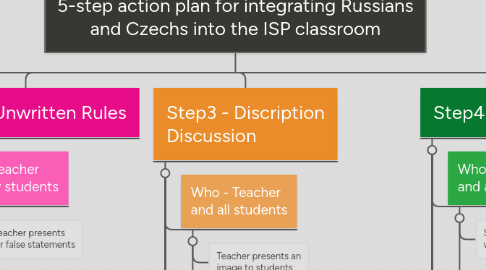
1. Step1- Handbook
1.1. Who - Pairs of students sharing same mother tongue
1.1.1. Expert students share handbook
1.1.2. New students ask clarifying questions
1.2. What - Mother Tongue Handbook
1.2.1. ISP rules explained from the older student's native social perspective in their mother tongue language
1.3. Where - in class
1.4. When - start of year
1.5. Why - school rules are important
1.5.1. understanding the international school rules is key to academic success
1.6. How - Make and Share Mother Tongue Handbook
1.6.1. Experienced students translate important rule sections of the ISP student handbook and make comparisons to native nation schools.
1.6.2. The Experienced students share their handbook to new students to ISP with the same mother tongue.
1.7. Assessment - did the hand book promote understanding of school rules?
1.7.1. Did the experienced student make a handbook and share it with new students?
1.7.2. Did the new students discuss the Mother Tongue Handbook in their native language?
2. Step2 - Unwritten Rules
2.1. Who - Teacher and new students
2.1.1. The Teacher presents true or false statements
2.1.2. Students guess true or false
2.2. What - make the culture norms of ISP explicit
2.2.1. clearly state classroom expectations and behavioral norms
2.2.2. dispel preconceived notions and common but incorrect assumptions
2.3. Where - in class
2.4. When - start of year
2.5. Why - promote good decision making
2.5.1. The ISP school culture may have very different or unknown behavioral expectations
2.5.2. Not knowing the school culture can be embarrassing and stressful
2.6. How - True / False Quiz
2.6.1. Factual statements are presented to the students ie. There is no need need to listen to our classmates questions and comments in class.
2.7. Assessment - Did the new students participate?
2.7.1. Did everyone vote true or false?
2.7.2. Were some students surprised?
2.7.3. Did it spark class discussions?
3. Step3 - Discription Discussion
3.1. Who - Teacher and all students
3.1.1. Teacher presents an image to students
3.1.2. Teacher directs students attention to an object or event
3.2. What - personal perspective
3.2.1. understand that multiple correct perceptions of a singular event or object exist
3.3. Where - in class or outside
3.3.1. Could be part of a field trip
3.4. When - midyear
3.5. Why - respect viewpoints
3.5.1. increase tolerance of student differences by understanding and respecting that people naturally have different perspectives
3.6. How - group and class discussion
3.6.1. student groups describe a photo ie. rank the important features
3.6.2. present to the class and discuss differences in the groups descriptions
3.7. Assessment - did the stimulus provoke different points of view?
3.7.1. Did the students share different points of view?
4. Step4 - Discrimination
4.1. Who - teacher and any students
4.1.1. Students create lists of people who suffer discrimination
4.1.2. Teacher facilitates discussion
4.2. What - differentiate between ‘difference’ and ‘discrimination’
4.3. Where - in class
4.4. When - midyear
4.5. Why - promote empathy
4.5.1. live and learn in harmony with people from different cultures and backgrounds
4.6. How - class discussion of students' lists
4.6.1. Students list groups that students have seen suffer prejudice
4.6.2. Teacher facilitates a discussion and reflection on why this happens
4.7. Assessment - lists and discussion
4.7.1. Did the students identify groups that suffer discrimination?
4.7.2. Did discussion promote understanding of who suffers discrimination?
5. Step5 - Debate
5.1. Who - teacher and all students
5.1.1. Students research and debate
5.1.2. Teacher moderates the debate
5.2. What - human rights
5.2.1. become familiar with and understand the relevant international documents
5.3. Where - in class
5.4. When - yearend
5.5. Why - understand inequities
5.5.1. To raise awareness of the difference between treating people equally and the need for equity to ensure equal outcomes
5.6. How - research + debate
5.6.1. research and debate the value of a major international treaty like the Universal Declaration of Human Rights
5.7. Assessment - debate
5.7.1. Did the students use evidence from the chosen document in their debate?
